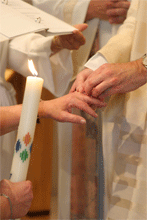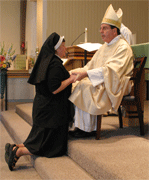[[Because the Hermit had (should still have) no status, position, authority, power or role in the institutional Church, and would usually be unknown by and not know those who sought her or his advice, such advice was free from any of the often complex subtexts, hidden agendas, personal preferences and prejudices, or politics that almost always intrude into conversations, especially those within institutions, and most especially within the institutional Church. The Hermit spoke freely and frankly, from the heart, always open to the guidance of the Spirit, and without (as it is often phrased) fear or favour.]] City Desert on Eremitical Service
 Great question, and one I have approached here before in some ways. For instance, I have written about the supposed increasing institutionalization of the hermit life as a possible betrayal of the vocation in On the Growing Institutionalization of Eremitical Life and about the eremitical life as prophetic in Hermit Life as Prophetic, etc. Feel free to check these out if you want. In any case, I entirely agree with the spirit of the statement as an ideal for hermits. On the other hand I don't think it is entirely accurate as far as history goes, and in fact, I think it is somewhat naïve in regard to the way anyone relates to their culture or church.
Great question, and one I have approached here before in some ways. For instance, I have written about the supposed increasing institutionalization of the hermit life as a possible betrayal of the vocation in On the Growing Institutionalization of Eremitical Life and about the eremitical life as prophetic in Hermit Life as Prophetic, etc. Feel free to check these out if you want. In any case, I entirely agree with the spirit of the statement as an ideal for hermits. On the other hand I don't think it is entirely accurate as far as history goes, and in fact, I think it is somewhat naïve in regard to the way anyone relates to their culture or church. In saying this I don't mean that hermits did and do not speak freely, frankly, and without fear or favor in the power of the Holy Spirit. However, I do mean we have always addressed people with minds and hearts that to some extent are shaped by our families, culture, and general historical circumstances and that what we say and do always reflect these influences in one way and another. The Spirit frees us to speak honestly and without fear but we cannot be entirely free of the conditioning qualities and hermeneutics which guide the way we pray, believe, think, read Scripture, relate to authority, etc. The kind of objectivity pointed to by this passage is simply not entirely possible. All reality is interpreted reality; it is always perceived through a multitude of lenses supplied by our upbringing, education, culture, and so forth. This is true even when we are speaking of spirituality or when the position we adopt vis-a-vis the Church and World is a counter-cultural one.
 A second concern I have is that this passage makes it sound like the eremitical life is best lived not merely from a position of radical Christian marginality but from outside the Church. Since I don't know the context or source of the passage** it might well be the case that the author is thinking about the desert Abbas and Ammas when eremitical life was lived in a conscious opposition to the Church's too-complete accommodation of and assimilation to the culture and politics of the time. In those early centuries thousands of desert dwellers participated in a kind of eremitical protest movement and were indeed a prophetic presence challenging the Church to become her better self living in the world while not being of it. Geographically and socially this kind of movement was possible. I don't think that is true today. Moreover I am a strong believer in the notion that authentic prophecy today is lived from a stance of profound love within the institutional Church, not from outside it. In this too the eremitical element of "stricter separation from the world" means one shuns enmeshment but remains profoundly (if uniquely) engaged; it means a kind of detachment associated with a love which is purified of inordinate attachments. (cf On attachments, Detachment, and Friendship in the Eremitical Life)
A second concern I have is that this passage makes it sound like the eremitical life is best lived not merely from a position of radical Christian marginality but from outside the Church. Since I don't know the context or source of the passage** it might well be the case that the author is thinking about the desert Abbas and Ammas when eremitical life was lived in a conscious opposition to the Church's too-complete accommodation of and assimilation to the culture and politics of the time. In those early centuries thousands of desert dwellers participated in a kind of eremitical protest movement and were indeed a prophetic presence challenging the Church to become her better self living in the world while not being of it. Geographically and socially this kind of movement was possible. I don't think that is true today. Moreover I am a strong believer in the notion that authentic prophecy today is lived from a stance of profound love within the institutional Church, not from outside it. In this too the eremitical element of "stricter separation from the world" means one shuns enmeshment but remains profoundly (if uniquely) engaged; it means a kind of detachment associated with a love which is purified of inordinate attachments. (cf On attachments, Detachment, and Friendship in the Eremitical Life) Similarly, I believe that eremitical life itself is a gift of the Holy Spirit to the Church and world which, because it lives from and for the Gospel, must be lived from inside the Church. Unless this is the case we are dealing with neither a truly prophetic lifestyle nor one which speaks from an authentically marginal position within the Church. It will have relinquished these and the legitimate authority necessary becoming instead an ineffective gadfly committed to one's own individualist perspective. It is, after all, possible to cease being marginal and simply become an alien. The hermit, it seems to me, is called to a significant marginality from within the heart of the Church. As "ecclesiola" she accepts a very unusual status and role within the Church for the sake of the Gospel and life of the Church herself. Because I believe the Gospel can only be effectively proclaimed and embraced from within the Church I believe an eremitical life witnessing to the redemption of Christ and the Gospel of reconciliation in Christ must itself be lived from a profound place within the Church.
Still, I think the ideal articulated in this passage has to be a guide to any hermit. We must strive to be as free from the kinds of prejudices, agendas, personal preferences and politics that prevent us from seeing clearly or fulfilling the prophetic role of the eremite in today's Church and/or society. So long as the author of the passage cited was stating an ideal perspective to be undertaken from within the Church we are in essential agreement (and probably strongly so). But this requires that the hermit accept she has a role in the Church and that, paradoxically, carrying out this role (which the Church herself actually honors and may even formally commission) may require she accept some kind of standing (canonical standing for instance) and limited authority (for instance, to live this life in the name of the Church as well as on her behalf).
Profound Paradox at the Heart of Eremitical Life:
Here is one of the profoundest paradoxes of ecclesial eremitical life; it is one of the things which makes this vocation so special, so rare, and also so risky and difficult for hierarchs. Bishops are called to profess, consecrate, and supervise individuals living a Gospel truth and freedom which may necessarily lead to an occasional "butting of heads" or, at the very least a style of obedience some may not be comfortable with. Similarly it is profoundly risky and difficult for the hermit herself. She is called by God and by the Church to act with an integrity in the Spirit that will leave no one untouched by the challenge of the Gospel. This may mean acting in ways which have the potential (remote though that may be) of leading to the eventual dispensation of her vows --- a situation analogous to Aquinas' treatment of the requirements of conscience. Remember that Aquinas said that even should acting in good conscience lead to unjust excommunication, one must act as determined and bear the excommunication in humility. The solitary hermit who takes the prophetic character of her vocation seriously may well find herself in precisely such a situation because the requirements of living the Gospel radically and because the Church's own commission (which is also inspired by the Spirit) may place her there.
Because I recognize this dynamic and responsibility at the heart of my vocation --- a dynamic rooted in love and the summons of the Church and her Lord --- I do not think my vocation is a betrayal of traditional eremitical life. I believe I have embraced an essentially prophetic call which I pray every day I may be worthy of and live with integrity. It is possible, even likely, that most hermits will never be touched by the kind of conflict envisioned here; the prophetic character of our lives will be lived out in a radical witness to what it means to be truly human and thus, in a contemplative dialogue/union with God that consoles and challenges but without serious conflict with, for instance, the institutional Church. But occasionally, precisely because our vocations are ecclesial and because our talents and training serve God and the Church, the hermit will be called by the Church herself to witness to a truth which others in the Church who ALSO have ecclesial vocations will feel they must resist or reject.
 It is here that the Love which empowers these persons and the humility which comes from God alone must clearly govern matters. It is here where life experience, competent spiritual direction, and practice in discernment becomes especially critical. It is also here where the relationship between a hermit and her legitimate superiors must be grounded in and seasoned with a mutual respect and trust that allows the charitable and wise negotiation of the situation itself for the good of all involved --- including the good of the eremitical vocation itself. I am convinced that such a prophetic role will not arise for hermits who place themselves outside the purview of the Church and I am absolutely convinced that it cannot be effectively embraced by such a hermit.
It is here that the Love which empowers these persons and the humility which comes from God alone must clearly govern matters. It is here where life experience, competent spiritual direction, and practice in discernment becomes especially critical. It is also here where the relationship between a hermit and her legitimate superiors must be grounded in and seasoned with a mutual respect and trust that allows the charitable and wise negotiation of the situation itself for the good of all involved --- including the good of the eremitical vocation itself. I am convinced that such a prophetic role will not arise for hermits who place themselves outside the purview of the Church and I am absolutely convinced that it cannot be effectively embraced by such a hermit.** Source was provided and added after I had responded to the passage.








































